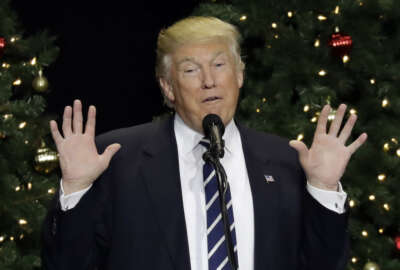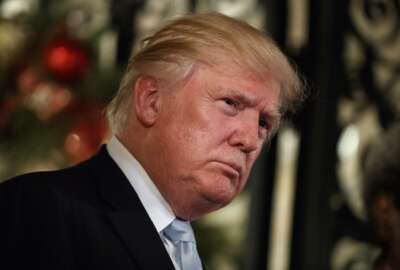
Before Trump’s inauguration, Congress, OGE take another look at federal ethics regulations
Both members of Congress and the Office of Government Ethics are attempting to get their hands around what was once an arcane federal ethics issue: discretionar...
With less than two weeks until Inauguration Day, members of Congress and the Office of Government Ethics are questioning just how they plan to deal with potential conflicts of interest from President-elect Donald Trump.
A group of Democrats in the House and Senate introduced a new bill that would require the President, Vice President, their spouses and their children to disclose and divest any potential financial conflicts of interest and put those assets in a blind trust. The Presidential Conflicts of Interest Act would require that the President put those investments in a blind trust.
“It [adopts] the sense of the Congress that the president’s violation of financial conflicts of interest laws or the ethics requirements that apply to executive branch employees constitute a high crime or misdemeanor under the impeachment clause of the U.S. Constitution,” according to a fact sheet from Sen. Elizabeth Warren (D-Mass.), who introduced the bill Jan. 9.
Rep. Katherine Clark (D-Mass.) introduced the House companion. The legislation only has support from Democrats, about 24 senators and six congressmen in total.
The bill would also prohibit political appointees from participating in any matters relating to the President or Vice President’s financial interests. In addition, the Office of Government Ethics must submit a report on both leaders’ — and their spouses’ and children’s — financial interests to Congress every year.
This comes as OGE questions prior guidance on whether an executive branch employee’s interests in a discretionary trust violates criminal conflict of interest statute.
The Trump transition team has indicated that the President-elect may consider having his children run a blind trust for his financial interests during Trump’s time in office.
OGE released a request for public comment Jan. 3, which questions how the criminal conflict of interest prohibition might apply to certain executive branch employees who have interests in discretionary trusts.
The agency previously released guidance on the matter back in 2008 and 2013.
“The trustee pays to a beneficiary only so much of the income in principle as the trustee in his/her totally uncontrolled and unfettered discretion sees fit,” said Rob Walker, counsel in the election law and government ethics practice at Wiley Rein. “So the beneficiary may or may not get any distribution or income. The trustee determines which of the beneficiaries gets any distribution and when, or the trustee could presumably return everything back to the corpus of the trust. That’s the theory of the discretionary trust.”
According to OGE’s 2008 guidance, an employee, who is a beneficiary of a discretionary trust, does not have a financial conflict of interest. And based on 2013 guidance from the agency, the employee does not have to report any holdings in that discretionary trust in an executive branch financial disclosure report.
“The theory [is] that they don’t have a financial interest because it’s entirely contingent and may or may not exist,” Walker said.
But some legal experts say OGE’s latest notice shows the agency is now questioning its previous opinions and that the agency wants other professionals to weigh in.
“OGE was looking at what was basically a fairly obscure memo from 2008 and saying, now this issue is really central,'” Walker said. “We said this in 2008. Is that right? Can we rely on this? Ought we to rely on this? The stakes are higher for this issue now. Who knew discretionary trusts were going to be such a big deal? But the stakes are higher; OGE is saying we need to get it right, now.”
OGE’s notice also sends a message to the Justice Department, Walker said, to alert it that this issue is a challenging one and a question that should be on DoJ’s radar.
It’s “an attempt to broaden criminal conflict of interest statutes to deal with a new president with an unprecedented situation,” said Lynne Bernabei, founding partner of Bernabei & Kabat law firm.
Several lawmakers, mostly Democrats, have questioned the President-elect’s financial interests in recent months.
OGE in December said Trump’s plans to to put his financial assets in a blind trust controlled by his children may violate federal ethics rules. The agency didn’t offer a concrete decision at the time but merely offered its interpretation of the Ethics in Government Act.
“Clearly, transferring control of the Trump organization to his sons Donald Jr. and Eric, as the President-elect announced his intention to do yesterday, does not solve the numerous conflicts facing the President-elect and his incoming administration,” Sen. Tom Carper (D-Del.) wrote in a statement following OGE’s Dec. 13 comments.
Public comment on OGE’s latest notice closes March 6.
Copyright © 2024 Federal News Network. All rights reserved. This website is not intended for users located within the European Economic Area.
Nicole Ogrysko is a reporter for Federal News Network focusing on the federal workforce and federal pay and benefits.
Follow @nogryskoWFED
Related Stories

Before Trump’s inauguration, Congress, OGE take another look at federal ethics regulations




